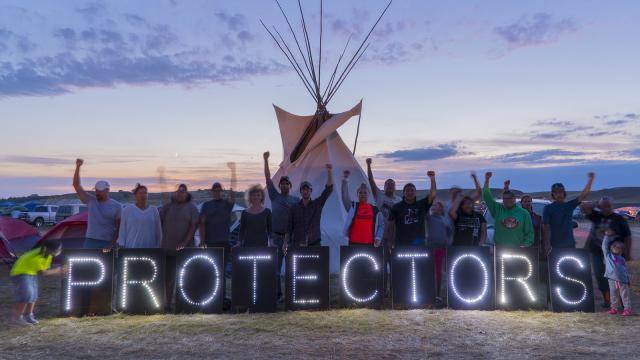

Water Protectors, Standing Rock camp.
By Alison Cagle
March 25 — This is a statement from Earthjustice attorneys for the Standing Rock Sioux Tribe on the recent legal victory against the DAPL permit to route the pipeline under the Missouri River, which was granted by the Trump administration.


Water Protectors, Standing Rock camp.
A federal judge struck down permits for the Dakota Access Pipeline, even after COVID-19 precautions led to an unconventional day in court.
For the Standing Rock Sioux Tribe, there has never been any question of backing down from the fight to protect their homeland from the Dakota Access Pipeline.
Every year since 2016, the Tribal council has voted unanimously to continue legal challenges to the pipeline, which shuttles 600,000 barrels of crude oil a day within a mile upstream from the Standing Rock reservation. An oil spill into the nearby Missouri River would destroy the Tribe’s way of life. Earthjustice has represented the Tribe in its litigation.
On March 25, the Tribe gained a significant victory after a federal court struck down a permit to route the pipeline under the Missouri River, finding that the U.S. Army Corps of Engineers failed to consider the health and environmental impacts to the Tribe in the event of an oil spill. The court ordered the Corps to complete a full environmental review, and it also asked each side to weigh in on whether the pipeline should be shut down in the meantime.
The legal victory vindicates the Standing Rock Sioux’s perseverance. After the Tribe’s initial stand inspired global solidarity and a halt to the pipeline’s construction, the early wins were tragically reversed by the Trump administration, the oil started flowing, and the struggle shifted to the courts. The Tribe stood their ground through four years of legal fight and counting.
“After years of commitment to defending our water and earth, we welcome this news of a significant legal win,” says Standing Rock Sioux Tribe Chairman Mike Faith. “It’s humbling to see how actions we took four years ago to defend our ancestral homeland continue to inspire national conversations about how our choices ultimately affect this planet. Perhaps in the wake of this court ruling the federal government will begin to catch on, too, starting by actually listening to us when we voice our concerns.”
Last week’s hearing took place despite unprecedented hurdles, as traveling to D.C. became too dangerous amid the COVID-19 pandemic. Seattle-based Earthjustice attorney Jan Hasselman cancelled his flights and hotels — including a side trip to visit his mother in D.C. — and requested to hold the hearing via teleconference.
Yet heedless of the public health risk, Dakota Access’s lawyers, who are based in D.C., vehemently pushed back.
“They didn’t really have any good reasons,” says Hasselman. “It was incredibly tone-deaf to demand an in-person hearing in the middle of a public health crisis. But the court handled it very fairly. Nobody was at a disadvantage.”
On the day of the hearing, Hasselman delivered his case via phone, arguing that the Army Corps never fully assessed the imminent danger to the Tribe should the pipeline rupture. Despite not being able to read the courtroom or see the judge’s body language, Hasselman found ways to make the virtual accommodation work: Surrounded by fact sheets and regulatory citations taped to the wall of his home office, Hasselman had everything he needed to answer the judge’s questions.
The Tribe has persisted in challenging DAPL through the ups and downs of court victories and setbacks. In December 2016, the Obama administration put the pipeline on hold — only to have President Trump reverse that order on his second day in office. Even after a federal judge in late 2017 ordered the Army Corps to take into account the Tribe’s criticisms, construction continued. The Army Corps ignored that judge’s instructions.
The massive 2016 gathering of Tribes and allies defending Standing Rock Sioux territory from DAPL captured the world’s attention and attracted international media coverage. It helped give rise to a global movement of Indigenous resistance to fossil-fuel infrastructure projects.
The March 25 court ruling could be the beginning of the end for the pipeline. The Standing Rock Sioux Tribe is now preparing to argue that DAPL should be shut down while the Army Corps completes its review.
“This validates everything the Tribe has been saying all along about the risk of oil spills to the people of Standing Rock,” says Hasselman. “The Obama administration had it right when it moved to deny the permits in 2016, and this is the second time the court has ruled that the government ran afoul of environmental laws when it permitted this pipeline. We will continue to see this through until DAPL has finally been shut down.” (tinyurl.com/t3uph9d)
This statement was recently issued by over 30 groups. On Friday, March 28, Dr. Helyeh…
When Donald Trump announced massive tariffs on foreign imports April 2, Wall Street investors saw…
The century-long struggle to abolish the death penalty in the U.S. has been making significant…
Download the PDF May Day appeal to the working class Revolutionary change is urgent! Gaza…
Philadelphia On March 26, the Pennsylvania Supreme Court denied political prisoner Mumia Abu-Jamal permission to…
There are two important and overlapping holidays on April 22: Earth Day and Vladimir Lenin’s…